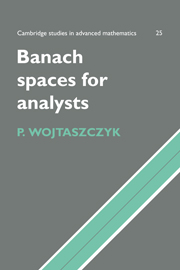Book contents
II.C - Weak compactness
Published online by Cambridge University Press: 03 May 2010
Summary
The sets compact in the σ(X, X*)-topology are important in many applications. We study such sets in this section. The main result is the Eberlein-Smulian theorem which says that weak compactness of a set is determined by properties of sequences, even when the σ(X, X*)-topology on this set is not metrizable. We apply this to study weakly compact operators, i.e. operators such that the image of any ball is contained in a weakly compact set. We show that each weakly compact operator factorizes through a reflexive space, and use this to investigate properties of such operators.
1. This section is devoted to the study of weakly compact sets in Banach spaces, i.e. subsets A ⊂ X which are compact in the σ(X, X*)-topology. We say that the set A ⊂ X is relatively weakly compact if its σ(X, X*)-closure in X is weakly compact. Prom Theorem II.A. 14 we infer that every bounded subset of a reflexive space is relatively weakly compact. Also by Theorem II.A.4 and II.A. 14 we get that every convex, bounded, norm-closed subset of a reflexive space is weakly compact. Also if X is a reflexive space and if T: X → Y is a continuous linear operator, then T(Bx) is a weakly compact set.
2. We have
Lemma.A subset A ⊂ X is relatively weakly compact if and only if it is bounded and the σ(X**, X*)-ciosure of i(A) in X** is contained in i(X).
- Type
- Chapter
- Information
- Banach Spaces for Analysts , pp. 49 - 56Publisher: Cambridge University PressPrint publication year: 1991



